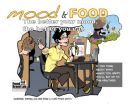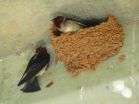(Press-News.org) Previous research has found that emotions affect eating, and that negative moods and positive moods may actually lead to preferences for different kinds of foods. For example, if given the choice between grapes or chocolate candies, someone in a good mood may choose the former while someone in a bad mood may choose the latter. The research reported in this article looks at the "why:" Why, when someone is in a bad mood, will they choose to eat junk food and why, when someone is in a good mood, will they make healthier food choices?
To get at the "why," we married the theories of affective regulation (how people react to their moods and emotions) and temporal construal (the perspective of time) to explain food choice. Conceptually, when people feel uncomfortable or are in a bad mood, they know something is wrong and focus on what is close in the here and now. We hypothesized and demonstrated that this kind of thinking gets us to focus on the sensory qualities of our foods – not things that are more abstract like how nutritious the food is. Analogously, we hypothesized and demonstrated that when people are in a good mood, things seem okay and they can take a big picture perspective. This kind of thinking allows people to focus on the more abstract aspects of food, including how healthy it is.
We studied these hypotheses in four laboratory experiments. In the first study, we investigated the effect of a positive mood on evaluations of indulgent and health foods by examining 211 individuals from local parent-teacher associations (PTAs). Next we studied whether individuals in a negative mood – who had read a sad story-- evaluated indulgent foods more positively and whether those who were in a positive mood indicated a desire to remain healthy into their old age. 315 undergraduate students participated in this study. In the third study, involving 151 undergraduate students, we altered participants' focus on the present versus the future along with their mood and measured how much healthy and indulgent food they consumed. To get more direct insight into the underlying process, the fourth study, involving 110 university students, focused specifically on the thoughts related to food choice and differentiated concrete taste versus nutrition benefits.
Ultimately, the findings of all the studies combined demonstrated that individuals select healthy or indulgent foods depending on whether they are in a good or a bad mood, respectively. The findings also indicate the integral aspect of the time horizon, showing that individuals in positive moods who make healthier food choices are often thinking more about future health benefits than those in negative moods, who focus more on the immediate taste and sensory experience. Finally we found that individuals in negative moods will still make food choices influenced by temporal construal which suggests that trying to focus on something other than the present can reduce the consumption of indulgent foods.
INFORMATION: END
Mood and food: The better your mood, the better you eat
2014-02-25
ELSE PRESS RELEASES FROM THIS DATE:
Use of acetaminophen during pregnancy linked to ADHD in children, UCLA researchers say
2014-02-25
Acetaminophen, found in over-the-counter products such as Excedrin and Tylenol, provides many people with relief from headaches and sore muscles. When used appropriately, it is considered mostly harmless. Over recent decades, the drug, which has been marketed since the 1950s, has become the medication most commonly used by pregnant women for fevers and pain.
Now, a long-term study by UCLA, in collaboration with the University of Aarhus in Denmark, has raised concerns about the use of acetaminophen during pregnancy.
In a report in the current online edition of ...
Building a better mouse model to understand pancreatic cancer
2014-02-25
(SALT LAKE CITY)—Cancer of the pancreas is usually not detected until it's too late to cure. But precursor lesions that form in the pancreas and its ducts can signal the disease before it strikes, and when caught early enough, they can be prevented from progressing to become cancer.
In a new study, researchers led by a molecular biologist at the University of California, San Francisco (UCSF), report two breakthroughs in understanding those lesions and their role in pancreatic cancer: the development of the first mouse model that simulates a precursor lesion called intraductal ...
Water is detected in a planet outside our solar system
2014-02-25
Water has been detected in the atmosphere of a planet outside our solar system with a new technique that could help researchers to learn how many planets with water, like Earth, exist throughout the universe. The team of scientists that made the discovery includes astronomers at Penn State University and other institutions. The astronomers detected the water in the atmosphere of a planet as massive as Jupiter that is orbiting the nearby star tau Boötis. The discovery is described in a scientific paper published in the 24 February 2014 online version of The Astrophysical ...
New blood test could detect heart attacks more quickly
2014-02-25
MAYWOOD, Ill. – A new blood test can detect heart attacks hours faster than the current gold-standard blood test, according to a study led by Loyola University Chicago Stritch School of Medicine researchers.
The new test measures a protein that is released to the bloodstream by dying heart muscle. The protein is called cardiac myosin binding protein-C (cMyBP-C). The study found that cMyBP-C is released to the blood within just 15 minutes of cardiac damage, and rises to significant levels in three hours.
"This is a potential ultra-early biomarker that could confirm whether ...
Vascular disease affecting women 'poorly understood' by many health care providers
2014-02-25
MAYWOOD, IL – A vascular disease called fibromuscular dysplasia, which can cause high blood pressure, kidney failure, stroke and other symptoms -- mostly in women -- is "poorly understood by many healthcare providers," according to a Scientific Statement from the American Heart Association.
Neurologist Jose Biller, MD, of Loyola University Medical Center, is a co-author of the statement, published online ahead of print in the American Heart Association journal Circulation. First author is Jeffrey W. Olin, DO of Mount Sinai School of Medicine.
Biller said FMD "is a ...
Using stolen computer processing cycles to mine Bitcoin
2014-02-25
A team of computer scientists at the University of California, San Diego, has taken an unprecedented, in-depth look at how malware operators use the computers they infect to mine Bitcoin, a virtual currency whose value is highly volatile.
Researchers examined more than 2,000 pieces of malware used by Bitcoin mining operations in 2012 and 2013. They were able to estimate how much money operators made off their operations and which countries were most affected. The computer scientists report that the revenue of 10 of the mining operations they studied reached at least 4,500 ...
Strawberries lower cholesterol
2014-02-25
A team of volunteers ate half a kilo of strawberries a day for a month to see whether it altered their blood parameters in any way. At the end of this unusual treatment, their levels of bad cholesterol and triglycerides reduced significantly, according to the analyses conducted by Italian and Spanish scientists.
Several studies had already demonstrated the antioxidant capacity of strawberries, but now researchers from the Università Politecnica delle Marche (UNIVPM, Italy), together with colleagues from the Universities of Salamanca, Granada and Seville (Spain), conducted ...
The importance of (experimental) design
2014-02-25
There are clear advantages to living in cities: safety, ready availability of infrastructure, plenty of company etc. Nevertheless, a large number of people eschew them for the benefits of country life, such as clean air and lots of space. Many species of animals, and particularly birds, face the same choice between living in large groups or remaining in smaller ones, thereby avoiding disadvantages of larger colonies such as the increased risk of disease and increased aggression from neighbours. What causes different individuals of a particular species to take the decisions ...
New study finds concussion-related health problems in retired football players
2014-02-25
New Rochelle, NY, February 25, 2014—Repeated concussions and mild brain trauma can result in reduced levels of growth hormone, gonadotropin, and thyroid hormones, causing disorders such as metabolic syndrome and erectile dysfunction and overall poor quality of life. The results of a new study of retired professional football players that compares number of concussions sustained during their careers and health problems associated with hormonal deficiency is published in Journal of Neurotrauma, a peer-reviewed journal from Mary Ann Liebert, Inc., publishers. The article is ...
Mother to child HIV transmission at record low in the UK
2014-02-25
The rate of mother to child HIV transmission is at an all-time low in the UK, according to a paper published today in the journal AIDS.
The study examined over 12 000 pregnancies in women diagnosed with HIV before or during pregnancy and delivered in 2000-2011; there was a four-fold drop in the rate of mother to child transmissions, from 2.1% in 2000-2001 to 0.46% in 2010-2011.
Dr Claire Townsend (UCL Institute of Child Health) said: "Mother to child HIV transmission is now at the lowest level ever in the UK & Ireland, and as far as we're aware such low levels have ...





